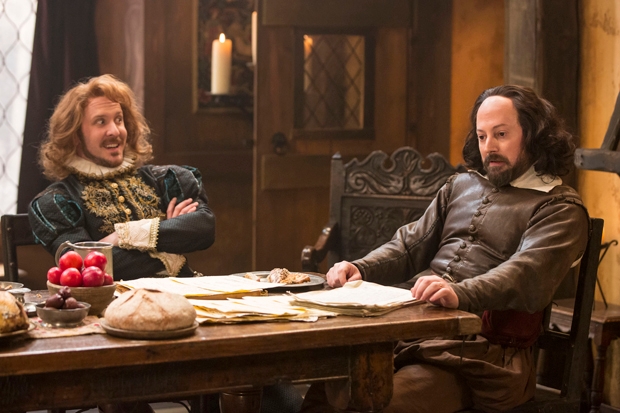There’s no way of saying this without shredding the last vestiges of my critical credibility, but this new Ben Elton comedy series, Upstart Crow (BBC2, Mondays), about William Shakespeare: I’m loving it and think it’s really, really funny.
Yes, all right, it’s very like season two of Blackadder — which Elton co-wrote with Richard Curtis. But that, believe it or not, was more than 30 years ago — I know it was because I remember going to watch an episode with friends in the Brasenose college JCR, one of whom, three decades later, would become the butt of a joke in Upstart Crow on the subject of entitled young toffs at Oxbridge inserting their members into dead farmyard animals — and I’m not sure that Elton has done anything nearly as brilliant since.
Upstart Crow, though, is up there with Elton’s very best stuff — cleverly milking every last cliché about the life, works and myth of William Shakespeare to create gags which, though often broad and obvious, flatter your intelligence even as they give you glorious, cheap belly laughs. And maybe the odd knowing chuckle.
‘Will, I told ya. Don’t do comedy. It’s not your strong point,’ says Anne Hathaway (Liza Tarbuck) who, like most of his family (including his bit-of-rough dad, played by Harry Enfield), speaks in anachronisms (‘yeah, right’, etc.) with a rich Black Country accent, while only Will himself speaks in cod-Elizabethan. ‘It is my strong point, wife. It just requires lengthy explanations and copious footnotes. If you do your research my stuff is actually really funny,’ Will replies.
There are jokes about Will’s receding hairline; jokes about his use of the word ‘wherefore’ in Romeo and Juliet (‘People will definitely think it means “Romeo, where are you?”’ insists Will’s missus, who finds his language far too abstruse and flowery); jokes about his putative gayness (‘God’s naughty etchings! Why does everybody presume that just because I write 126 love poems to an attractive boy I must be some kind of bechambered hugger-tugger?’)
That last coinage could have come straight out of Blackadder, as of course could the character of David Mitchell’s Will (a preternaturally brilliant man in a world of stupid), his dim-ish manservant Bottom, his patron’s daughter and would-be Juliet Kate (shades of ‘Bob’ — and also, now I think of it, of Shakespeare in Love), and the bombastic Master of the Queen’s Revels Sir Robert Greene (Mark Heap), who comes across like a mix of Flashheart and Lord Melchett. But this is all to the good. Blackadder II only ran to a paltry six episodes. I hope this delightful, thinly disguised sequel runs to many, many more.
Another cliché has it that if Shakespeare were alive today, he’d be writing soaps. More specifically, though, he’d be writing Game of Thrones, as director Dominic Cooke’s pared-down adaptation of Henry VI — Part One, the latest instalment in the Hollow Crown cycle, made thrillingly, viscerally clear (BBC2, Saturday) — most explicitly in the casting of Anton Lesser (Qyburn in Thrones) as the Duke of Exeter.
I’d love to be able to carp in erudite detail about the liberties it took with Shakespeare’s originals, but unfortunately I never got round to reading them. Yes, I’m sure I pretended to at the time and probably referenced them in my essays. But the truth is when you’re looking at the Collected Works and deciding which ones you can afford to skip, the most obvious candidate is the play written in not two but three separate parts. If they’d had sexier titles — maybe Henry V: the Cursed Wytches, for part one — I guarantee they’d be much better known.
I notice that lots of reviews of this hugely enjoyable adaptation have used variations on the line ‘purists may carp…’ But I don’t think those notional purists actually exist. All the Shakespeare scholars and fans I can think of will have loved it, because it shows how endlessly adaptable and versatile and modern he is.
As regards Thrones, the weak Henry VI (a suitably insipid, pretty-boyish Tom Sturridge) was clearly the model for the nice but useless King Tommen; the voluptuous, she-wolf Margaret of Anjou is a ringer for Cersei; Joan of Arc’s burning at the stake became the more poignant and grislier death of Shireen Baratheon.
Then again, the Wars of the Roses didn’t half provide both authors with some pretty racy source material. After the Battle of Towton, for example, no fewer than 60 knights and gentlemen on the losing (Lancastrian) side were attainted. That is, they were hanged, drawn and quartered (i.e., eviscerated while still alive), had all their goods confiscated and their heirs disinherited in perpetuity.







Comments